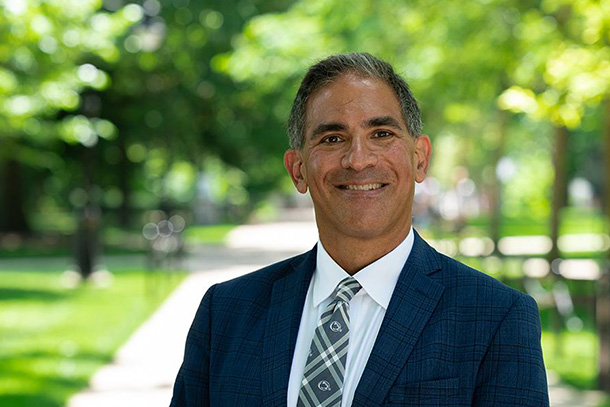
Justin Schwartz, Harold and Inge Marcus Dean in the College of Engineering, will assume the role of Penn State's interim executive vice president and provost on Aug. 15. Credit: Kelby Hochreither/Penn State
Justin Schwartz named interim Penn State executive vice president and provost
Schwartz will assume the interim role on Aug. 15; national search planned for fall
June 27, 2022
UNIVERSITY PARK, Pa. — Justin Schwartz, Harold and Inge Marcus Dean in the College of Engineering, will assume the role of interim executive vice president and provost at Penn State on Aug. 15 following a transitional period that will begin in mid-July.
As shared in Penn State News, Nick Jones, executive vice president and provost, will step down Aug. 15 and transition into a new role as special assistant to President Neeli Bendapudi through the end of 2022. Jones will return to the College of Engineering, where he has an appointment as a professor in the Department of Civil and Environmental Engineering. The University plans to conduct a national search for Jones’ successor this fall, working with a search firm to hire a permanent leader in the spring of 2023.
Beginning on Aug. 15, Anthony Atchley, senior associate dean and professor of acoustics in the College of Engineering, will assume the role of acting dean for the college.
“I am so appreciative that Justin has accepted this important position during this transitional time as we prepare to search for Penn State’s next executive vice president and provost,” Bendapudi said. “Justin’s commitment to supporting faculty, students and staff; expanding equity and inclusion in engineering; advancing new knowledge; and bettering the world through science make him ideal for this role.”
As interim executive vice president and provost, Schwartz will oversee Penn State’s academic units — including colleges and campuses — and major academic support units, as well as serve on the President’s Council, chair Penn State’s Council of Academic Deans and the Academic Leadership Council, and serve as an ex officio member of the University Faculty Senate and Senate Council.
“It is a privilege to serve in this role, and I look forward to learning from President Bendapudi while supporting and advancing her vision for Penn State,” Schwartz said. “I am deeply committed to the academic mission of the University and to our students, faculty and staff. Through this transition, I have every confidence that the College of Engineering also will continue its upward trajectory as we advance Penn State’s collective impact on the commonwealth and throughout the world.”
Schwartz, who has served as dean at Penn State since 2017, has an over 30-year career in higher education as an academic administrator, researcher and faculty member, and is a leader in the interdisciplinary field of applied superconductivity. In his role as dean, Schwartz oversees more than 520 faculty members, 400 staff and 12,000 students, and approximately $250 million in annual expenditures within the College of Engineering, which is comprised of 13 departments and schools, as well as the Engineering Energy and Environmental Institute, the Facilities Engineering Institute, the Larson Pennsylvania Transportation Institute and the Global Building Network.
During his time at Penn State, Schwartz has increased the College of Engineering’s tenure-line faculty by approximately 30% over four years and has helped to grow the college’s endowments to $400 million.
To support broad efforts to build a more inclusive academic community and equitable engineering workforce, Schwartz launched the Engineering Equity Initiative. As part of this initiative, the college has created the position of associate dean for equity and inclusion; promoted corporate and alumni fundraising in support of equity; transformed scholarship awarding protocols, significantly improving female and underrepresented yield; and created an allies program to engage non-underrepresented students and male students as equity partners.
In addition, he helped create the Law, Policy and Engineering Initiative, which brings together faculty from the College of Engineering, Penn State Law and Penn State School of International Affairs to establish research and scholarly collaborations across multiple disciplines. He also helped establish the Global Building Network, a partnership between Penn State and the United Nations to create an international framework that aims to make buildings more sustainable, more efficient and healthier for people and to facilitate the training of the next generation of built environment professionals.
Prior to joining Penn State, Schwartz was distinguished professor and department head of materials science and engineering at North Carolina State University where he led change in the department with a clear focus on advancing faculty excellence and student success over the eight years of his tenure.
In his previous roles at Florida State University (FSU), where he joined the faculty of the Department of Mechanical Engineering in 1993, Schwartz was the Jack E. Crow Professor of Engineering and a senior research adviser to the vice president for research. Within FSU’s National High Magnetic Field Laboratory, he served as the leader of the HTS (high-temperature superconductor) Magnets and Materials Group. In 2003, his research group, in collaboration with Oxford Instruments, established the world record for highest magnetic field generation by a superconducting material.
In 2015, Schwartz co-founded and is chief executive officer of Lupine Materials and Technology Inc., an optical fiber sensors and magnetic materials company.
Schwartz’s research interests include superconducting, magnetic and multiferroic materials and the systems they enable. He is a fellow of the Institute of Electrical and Electronics Engineers, American Association for the Advancement of Science and ASM International.
He earned a bachelor’s degree in nuclear engineering from the University of Illinois at Urbana-Champaign and his doctorate in nuclear engineering from Massachusetts Institute of Technology.



